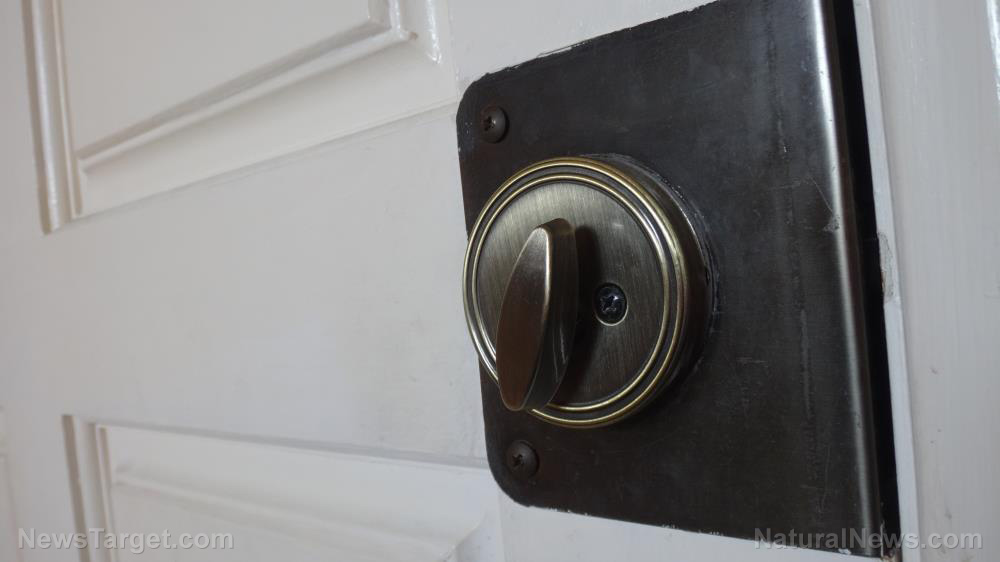
Preparedness applies to various aspects of your life – from common concerns like food in your kitchen or tools in your garage, to even the more uncommon ones like your knowledge of how to break down a door during an emergency. (h/t to ThePrepperJournal.com)
When SHTF, you may need to immediately escape danger or enter a locked room for safety. While a locksmith is a good choice on a regular day, it might not be the best option if time is of the essence.
Here are different methods and tips for breaching doors based on the tools that you may have in your prepping arsenal.
First, assess the door.
- Does the door swing inward or outward?
- Where are its locking mechanisms?
- Are the door hinges visible? If so, can you remove them?
If a door swings toward you, you need to work harder to breach it. Try to work on the hinges first.
You can easily remove the hinge pins off of a flimsy door. You'll need a nail, a flat blade screwdriver, a hammer, and a pry bar.
- Close and latch the door. Remove the hinge pins by tapping on the bottom of the hinge pin with a nail.
- Don’t force the pins all the way out with the nail. You could damage the trim if you hammer the nail.
- Once the hinge pins pop up about an inch or so, try to use your fingers to pull them free.
- If the hinge pins are stuck, try to drive up on the underside of the knuckle using the flat-blade screwdriver.
If you need to break open a well-designed exterior door, you'll be dealing with non-removable hinge pins. You'll need the fork end of a crowbar to completely shear the hinges off.
Do this by wedging the fork over the hinges one at a time, then hit the other end of the bar with a hammer. This might take several minutes but this is your only option if the door swings towards you.
When the locked side of a door opens by swinging away from you, look at where the locking mechanisms are located. In most cases, this type of door has a circular lock (dead bolt) along with the doorknob.
Sturdy doors may also have a chain lock higher up on the frame. This isn't a major impediment, but you may need deal with this lock after you breach others kinds of locks.
The toughest one to breach is the circular lock, but these types of locks are easy to break through, unless you're trying to deal with a highly-reinforced door. Focus on forcing the locking hardware through the surrounding jamb.
Breaching doors with a kick
Unless you're an action hero, you need to be careful when you're kicking down a door.
As you kick the door, make sure your heel lands as close to the locking mechanism as possible. If you have time, try a light practice kick or two to see if your foot lands near the lock. Make sure your aim is straight, then kick the door.
After several tries, you'll notice space start to emerge between the door stile and the jamb. The door may even collapse in on itself. The majority of modern doors are hollow on the inside, except for light filler material. This is one reason why you need to kick as close to the locks as possible.
If you kick near the middle of the door, it may warp outwardly. This will make your strikes less effective. The edges of a door are usually well reinforced.
Aim your kicks at the locks that haven’t broken yet. If a lock is tougher to breach, adjust your aim. You'll eventually kick the locking mechanisms through the jamb and open the door. (Related: Prepping 101: What is situational awareness and why is it crucial for your personal safety?)
Breaching doors with tools
If you can't kick down a door, use some tools like an ax, crowbar, or a sledgehammer. Use an ax or sledgehammer the same way you would kick down a door.
When using an ax, use the blunt side to strike the doorknob the same way you would swing a baseball bat. This will direct a great amount of force directly through the locking mechanism, which will easily destroy the surrounding jamb. Before you swing the ax, make sure the area is clear to avoid hurting anyone.
Use a sledgehammer the same way you would use an ax. However, the sledgehammer is a better tool since its end will be heavier compared to the head of an ax. A sledgehammer will provide even more inertia as you try to breach a door.
Alternatively, you can use a crowbar to open a locked door. Wedge the curved end of a crowbar into the gap between the door and the jamb. You may need to use a blunt object to tap the end of the crowbar to get it fully wedged in, then crank away. Keep the crowbar close to the locks as you pry the door open.
Maximize your leverage as you pry a door open with a crowbar. Focus your weight on the far end of the bar to maximize the amount of force applied. Use the curve in the bar to put continuous pressure on the door as you pry it open. You're done the moment you create a large gap in the door. If the door doesn't fully open, breach the door with a well-placed kick.
As a responsible prepper, you should only use these techniques with caution when SHTF.
Sources include:
Please contact us for more information.





















